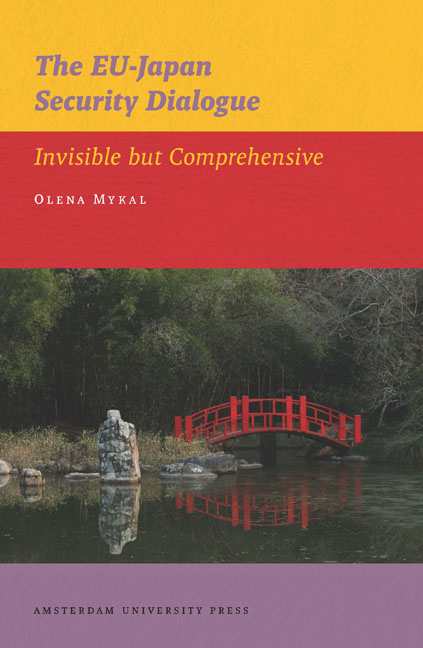Book contents
- Frontmatter
- Dedication
- Contents
- Abbreviations
- Acknowledgements
- Preface
- Introduction
- PART ONE DEVELOPING CONCEPTIONS OF SECURITY AND JOINT AGENDA OF THE EU-JAPAN SECURITY DIALOGUE
- PART TWO COMMON INTERESTS IN THE EU-JAPAN SECURITY DIALOGUE: ANALYSIS OF JOINT ACTIVITIES
- Conclusion
- About the Author
- Notes
- Bibliography
- Index
- Publications Series
- Frontmatter
- Dedication
- Contents
- Abbreviations
- Acknowledgements
- Preface
- Introduction
- PART ONE DEVELOPING CONCEPTIONS OF SECURITY AND JOINT AGENDA OF THE EU-JAPAN SECURITY DIALOGUE
- PART TWO COMMON INTERESTS IN THE EU-JAPAN SECURITY DIALOGUE: ANALYSIS OF JOINT ACTIVITIES
- Conclusion
- About the Author
- Notes
- Bibliography
- Index
- Publications Series
Summary
At the centre of our study is an examination of the security dialogue between Japan and the European Union (formerly the European Economic Community) from 1959 until 2006. For the purpose of this research, we established that the security dialogue refers to the discourse and joint activity cooperation between the EU and Japan in the security sphere, where security is treated from the perspective of the European and Japanese security conceptualisations. To finalise our conclusions, we proceed in three sections: First, we summarise the Japanese and the European security conceptualisations; second, we focus on the discourse part of the EU-Japan security dialogue; third, we recapitulate the development of the EU-Japan security dialogue in the security areas.
Japanese and European Union Security Conceptualisations
During the Cold War period, Japan developed two significant concepts that have shaped its involvement in the area of security. These are its ‘merchant nation’ identity and its comprehensive security doctrine, which supplement each other and, while not ruling out military involvement, emphasise non-military tools to maintain a security balance. In the 1990s-2000s, Japan's security vision did not deviate fundamentally from Japan's Cold War practices and comprehensive vision of security. Thus, Japan continued to insist that it would make non-military contributions to the international order. Since 1998, Japan has used its human security concept as the guiding principle of its foreign policy.
In other words, Japan has pursued its comprehensive security doctrine that was augmented in 1998 by the introduction of the human security doctrine with its emphasis on non-military tools while dealing with conflict resolution and prevention. Moreover, on the basis of Maull's and Funabashi's contributions, we argued that Japan is also identified by the peculiar concept of ‘civilian power’. However, along with the above developments, the adoption of the International Peace Cooperation Law in 1992, Antiterrorism Special Measures Law in 2001, Law Concerning Special Measures on Humanitarian and Reconstruction Assistance in 2003, reformations of the Defence Agency of Japan into the Ministry of Defence, as well as modifications in the SDF structure and granting primary status to overseas operations of the SDF suggest more active Japanese engagement in international military arrangements. As our analysis has shown, changes in the international climate pushed Japan to adapt to new conditions and, consequently, to play a more active role in security matters.
- Type
- Chapter
- Information
- The EU-Japan Security DialogueInvisible but Comprehensive, pp. 201 - 210Publisher: Amsterdam University PressPrint publication year: 2012



